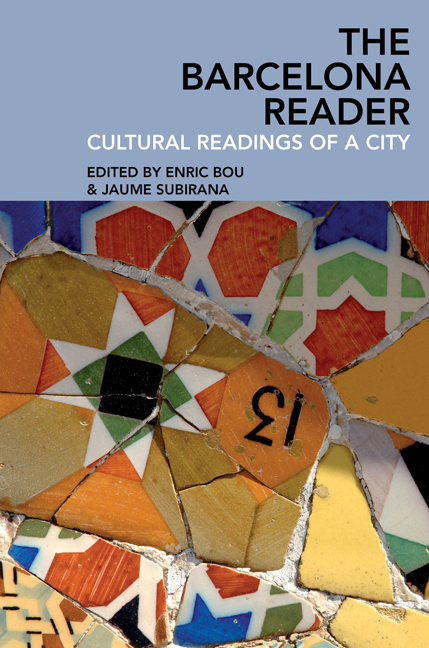Book contents
- Frontmatter
- Contents
- List of illustrations
- Notes on contributors
- Introduction: Barcelona: Cultural readings of a city
- I City, history, and territory
- II City and society
- III Art, architecture, and the city
- IV The Olympics and the city
- 13 Barcelona: Urban identity 1992–2002
- 14 From the Olympic torch to the Universal Forum of Cultures: The after-image of Barcelona's modernity
- V Literature, cinema, and the city
14 - From the Olympic torch to the Universal Forum of Cultures: The after-image of Barcelona's modernity
from IV - The Olympics and the city
- Frontmatter
- Contents
- List of illustrations
- Notes on contributors
- Introduction: Barcelona: Cultural readings of a city
- I City, history, and territory
- II City and society
- III Art, architecture, and the city
- IV The Olympics and the city
- 13 Barcelona: Urban identity 1992–2002
- 14 From the Olympic torch to the Universal Forum of Cultures: The after-image of Barcelona's modernity
- V Literature, cinema, and the city
Summary
Culture is just another name for propaganda.
Marc FumaroliSometimes an old, singular city, like Barcelona, by oversimplifying its identity, turns Generic. It becomes transparent, like a logo.
Rem KoolhaasIn the early 1930s, Élie Richard remarked of Catalans, ‘This is a peasant race that is becoming conscious of modernity’ (313). Richard was one of many French writers who visited Barcelona between the beginning of the century and the Civil War, but only he was able to capture the gist of the city's transformation in one sentence. Today, of course, we would not use the term race to designate ethnicity. Instead we would use the word people. Even so, the gap between the cultural reality that stared Richard in the face and the reality that meets the eye today is enormous. At that time, Barcelona was still a Catalan city bound to its hinterland by familial ties and by the steady flow of people, foodstuffs, and manufactured goods that sustained its growth through an osmotic relationship between the capital city and the territory. Today, Barcelona relates to Catalonia in an ambivalent, superficial way. Its primary connection is no longer kinship, history, or language, but the motorway and the weekend residence. At variance are many aspects of social and political life, to the point that it is justified to speak of a change of paradigm and not only of scale. I hesitate to call the new paradigm postmodern. My uneasiness with this term does not stem only from its proliferating connotations but above all from my suspicion that its usefulness for periodization is now exhausted, while the city's new historical cycle has just got under way. The implications of the ‘post-’ are particularly problematic in this case, because the present city does not activate all its historical resources but on the contrary seeks a rupture and a new beginning every so often, preferring short-lived illumination to the consciousness of what it experienced in the recent and not-so-recent past.
Some years ago I coined the term ‘after-image’ to designate temporally thick representations (Resina 2003). The term tries to account for the ghostly concurrence of phenomena originating in different temporal strata.
- Type
- Chapter
- Information
- The Barcelona ReaderCultural Readings of a City, pp. 347 - 380Publisher: Liverpool University PressPrint publication year: 2017

